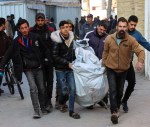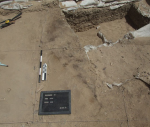You are here
The lessons of Gaza
Aug 03,2014 - Last updated at Aug 03,2014
The war on Gaza, precipitated by Israeli Prime Minister Benjamin Netanyahu and his politics of brinkmanship and double daring, has turned out to have historical implications not only for Israel but for the entire Western world.
To the West, it is proving that there are limits to power, and that their Zionised leaderships and disregard for the decent and lofty principles which were the foundations of Western civilisation itself have caused irredeemable damage of vast proportions. For, while the major international sources of Western media are tightly controlled by a few Zionised individuals, the Internet and its social media have proven themselves to be beyond the control of either the Western governments themselves or the tightly controlled international media. The brutal and merciless attacks on the residents of Gaza and the mounting number of civilian deaths — mostly children and women — that once could be ignored or hidden are now readily available to people everywhere via the Internet, Twitter, Facebook, etc. Even CNN, Fox News and the BBC, in an attempt to reassert their credibility, were forced to show what not so long ago could be ignored.
The images on Facebook and Twitter reaching the homes and streets of the world and especially ordinary people, young and old, are awakening humanitarian sentiments, feelings and human solidarity that the international media once dulled and sedated with its emphasis on the promotion of violence, sex and hedonism. This revival of humane feelings among Western people may prove to be a step towards not only justice for the Palestinians, but just as importantly, towards a futuristic search for the dilemma of human civilisation, which is now sinking deeper and deeper into trouble.
For us in the region — Arabs and Israelis — and the Jews of the world, the neutralising by a few fedayeen of the mighty Israeli army, an army once thought to be indestructible, should also be a historical moment for re-evaluation. For the Israelis, especially Netanyahu, Avigdor Lieberman, Naftali Bennett, Moshe Yaalon and other extremists, they need to begin re-examining the future of the “Homeland”. They need to ask themselves where they are leading their people and, more importantly, where Israel is leading the region. Is it towards more havoc and destruction? And what will their future look like in the next few years and decades? Whatever Israel or its mouthpiece, the international media, might say, the Palestinians have already won. This fact impels even the extremist right-wing leadership of Israel to start thinking seriously about the future. It will not be enough to go back to what used to be only a month ago, and the legitimate demands of the Palestinians will have to be addressed. It should be obvious, even to Netanyahu that the Palestinians — the Arabs, are not going to just go away.
The Iron Dome, the merciless bombardment by air and sea, and the land invasion by the 60,000-80,000 strong army have not broken the will of the Palestinian people. The futility and desperation of Israel was not even relieved by the Western navies that surrounded the region in the Arabian Gulf, the Arab Sea, Bab-el-Mandeb strait and the Mediterranean. None have been able to provide security for Israel. The future for Israel, should Israeli attitudes and policies towards the Palestinians not change, promises to be one of desperation and insecurity.
Israel’s security lies with its neighbours, the Palestinians, the Arabs. The destruction of Gaza, to my mind, is an act of a beleaguered and desperate people. Mr Netanyahu, with his non-Semitic origins from Brooklyn, New York and Khazaria, and the military machine he commands must realise that the Arabs are innocent of the Western, Nazi atrocities. No decent Semite, with his cultural roots in the Fertile Crescent or North Africa would commit the brutalities now being committed against the civilians in Gaza.
For the Arabs, the lesson of Gaza, like that of Hizbollah in Lebanon, is a sobering one which explains, in part, their frustration and anger against the inaction of their regimes.
Concern is not in making trouble for one party or another, but an attempt to force peoples and leaders everywhere to begin to think about the future. Peace is the answer to security; and justice its guarantor. Maybe it is time for world leaders, especially Western leaders, led by US President Barack Obama, to start developing a strategy for global peace built on justice instead of narrow-minded strategies to secure American or Western hegemony over the world. History tells us that no state was ever successful in achieving that goal and it does not look likely that it will be achieved in the future.
I have no idea how Western leaders can look themselves in the eye and not feel not just shame, but also disgust for their silence, complicity and attempts to find feeble excuses to justify the atrocities that Israel is committing in Gaza. I do not know of any world culture, either past or present, which would condone the targeting of innocent civilians. If the goal of these current atrocities was to teach the Palestinians and the Arabs a lesson, then it has succeeded: their spirit cannot be broken by the brute force of the Israeli army, and they continue to prevail against all odds. They have neither given up nor given in. Hopefully the leaders of the Western world — Obama, French President Francois Hollande, German Chancellor Angela Merkel and UK Prime Minister David Cameron among others — have also learned something. And finally it is hoped that the Jewish people themselves have learned the important lesson that whilst a heartless, mindless military machine can destroy, it cannot, in fact, bring about the security and peace so sorely needed in this region.
The writer was director of the Royal Institute for Interfaith Studies and former foreign minister of Jordan. He contributed this article to The Jordan Times.













